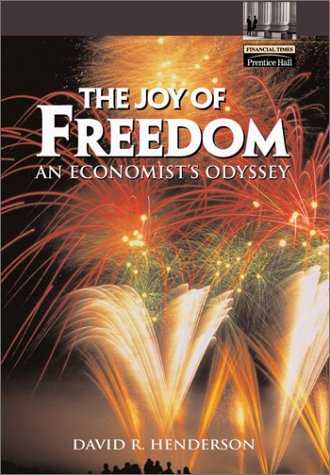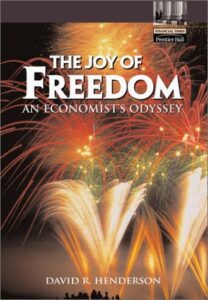

Co-blogger Scott Sumner wrote yesterday that the positive correlation between economic freedom and civic virtue was not something he expected.
It is something I expected. And it has to do with how free markets lead to virtue.
In a chapter titled “Market Virtues and Community” in my 2001 book, The Joy of Freedom: An Economist’s Odyssey, I wrote, “Markets teach or encourage at least three virtues: tolerance, honesty, and compassion.” In that chapter I spell out how.
Here’s what I write about Oskar Schindler, in response to Walter Mondale’s dissing of Schindler:
In other words, to Schindler, each person is worth counting—each has value; 850 differs from 851 by one person, and that person’s life matters. This is a major transformation. Earlier in the movie, after rescuing Stern from certain murder, Schindler had said angrily, “What if I got here five minutes later? Then where would I be?” He had been upset about being without an accountant. Now he cared about all his workers.
This transformation made some movie critics call Schindler “complicated” (San Francisco Chronicle) and “puzzling” and “contradictory” (Atlanta Journal and Constitution). But Schindler’s growing humanity is about as hard to understand as warm weather in summer and should surprise only those people who think about Marxist cardboard characters—“workers” and “capitalists”—rather than real human beings. Schindler started to like the people he worked with. Commerce does that. Almost all of us care for the people we work with, whether they are our employees, our employers, or our fellow workers. Indeed, we think of fellow workers who don’t care about anyone else as being odd, troubled, unusual. Anyone who knows employers knows that the part of the job many of them hate most is firing somebody.
Schindler was a hero—his actions were heroic because he took a big risk. But what led to his heroic actions was his caring for his employees, something that is quite normal. Virtually all of us would be willing to take some risks to help those around us, and the bigger the threat to their well-being, death obviously being the biggest threat, the bigger the risk we’re willing to take. So the transformation in Schindler, though heroic, was entirely normal. The free market created an environment in which Schindler learned to value people; in a sense, markets taught Schindler morality.
In that chapter I also lay out why economic freedom supports accountability and compassion.
Another story that I don’t relate in the book. In the late 1990s, I played volleyball with a regular group that included some people who, as adults, had escaped from Czechoslovakia. One thing I noticed about 2 of the 3 adults was that they often called balls in when they were out or out when they were in and always when that benefited their team. The other players didn’t do this nearly as often and sometimes made wrong calls that hurt their team. As I talked about it to another economist who played with us, it made sense. They had come from a Communist society where lying was a way of life, and it almost had to be because the stakes were so high.

READER COMMENTS
Richard W Fulmer
Aug 30 2023 at 9:05am
Envy is socialism’s greatest curse. In the days of the Soviet Union, Russians told the following joke about themselves: A Frenchman, an Englishman, and a Russian were all asked what would make him the happiest man in the world. The Frenchman replied, “I want to be the world’s greatest lover.” The Englishman said, “I’d like to be the world’s greatest equestrian.” The Russian’s answer was, “I want that my neighbor’s cow should die.”
People will remain poor – materially and spiritually – as long as they are so driven by envy that they would rather that their children go without milk than their neighbor have one more cow than they.
nobody.really
Aug 30 2023 at 8:28pm
Genie: I will grant you anything you wish–provided that your neighbor will receive twice as much.
Russian (after reflection): I wish for you to pluck my eye out.
Jon Murphy
Aug 30 2023 at 9:14am
I’ve heard the same thing from friends who have fled communist or totalitarian societies. You have to lie to sruvive. Being honest gets one ground beneath the wheels of the system. I’ve even noticed this in my own life. I have a relative who moved to a country considerably less free and liberal than the West (although that country is not Communist). Since then, this relative has become extremely vicious, mean, and manipulative; everyone, including family members, is a tool to get what this person wants. True, this is just one person, but the question remains: why did this behavior not manifest until they entered that society?
steve
Aug 30 2023 at 9:29am
Agree that it is hard to fire people. Have had to fire people I have worked with for over 20 years and considered friends. Just killed me. Anyway, working with people and getting to know them often makes most of us value people. I wouldn’t consider the military part of the free market and we were willing to risk our lives for each other. That wasn’t really because we would be fighting to protect the constitution or for freedom but because it was for each other. Nearly every mass school shooting has a teacher or teacher killed standing in front of her kids to try to protect them.
I was unaware of the cheap shot Mondale took at Schindler. It wasn’t needed to help praise what Sugihara did. Hope some contemporaries called him out on it.
Steve
S. F. Griffin
Aug 30 2023 at 9:46am
I spend a lot of time around Slovaks. One thing I noticed early on is a contrast between those that grew I up in the late 80s and early 90s vs those who were older. Maybe it is an age thing, but the younger cohort are just instinctively less greedy and grasping. They lack a certain cynicism that the older generation have. It wasn’t lost on me that they grew up in very different economic systems, but it is difficult to know if that is really the key.
steve
Aug 30 2023 at 11:46am
I had a med school classmate who jumped off a boat to swim to Taiwan and have worked with a number of Chinese who grew up in China. As a group i have found them honest and hard working. Makes me think it’s not communism per se but more cultural. Maybe communism could make it worse? Have been reading some Eastern European and Russian history and am inclined to think it’s more the culture.
Steve
Airman Spry Shark
Aug 30 2023 at 12:45pm
¿Por que no los dos?
By which I mean, perhaps Russian cultural dysfunction made that country more susceptible to Communism, which turned the preexisting problems up to 11.
Mark Z
Aug 30 2023 at 3:05pm
Russian culture has always been rather socialistic. Even pre-Soviet, most Russians lived in peasant communes where property was largely collectively owned. Land was allocated in a highly inefficient manner to make sure no one got a better overall land than anyone else. So the defects of ‘socialist culture’ there are much older there than the USSR.
Scott Sumner
Aug 30 2023 at 8:13pm
Even among people who live in Mainland China, the Taiwanese culture is widely viewed as nicer than the Mainland Chinese culture.
Mactoul
Aug 30 2023 at 10:55am
It isn’t clear what free market had to do with Schindler who wasn’t operating in any kind of free market. His humanity grew certainly but not because of free market. There were plenty of operators in similar situation who didn’t grew like Schindler.
Monte
Aug 30 2023 at 11:49am
Intuitively this makes sense and the numbers appear to bear things out. Democracy fosters economic freedom, and economic freedom causes higher levels of happiness, and emotional states of happiness breed nicer traits and behaviors.
David Seltzer
Aug 30 2023 at 4:14pm
David: Nice post! For many years I was a pit trader on the CBOE and AMEX. Trades were made in open-outcry, the purpose of which, all trades were witnessed. Each trader was held to a standard of fair exchange. Virtue and fair play were assured. If a trader scummed another, they were rebuked and ostracized. Many times when a trader blew out, some of us got together and bankrolled their return to business. In those markets I was known to as a fair man. That was the best I could have wished for.
nobody.really
Aug 30 2023 at 8:54pm
Wooooow! All I ever did was play Pit.
And, though no one called me a “fair man,” one New Englander would approvingly call me a “regular guy.” (I was never quite sure what he meant–but he was often constipated, so perhaps he was drawing a contrast….)
nobody.really
Aug 30 2023 at 8:47pm
Given the title, I was expecting to hear a story about the Ultimatum Game. I guess I’ll have to tell it.
In the Ultimatum Game, famously, people in Western democracies demand to receive equitable treatment from strangers (or else they refuse to cooperate). Knowing this, people in Western democracies pretty much always offer equitable terms. In contrast, people in more tribal cultures both offer less equitable treatment to strangers and expect less equitable treatment. Why the difference?
Tribal people were not stingy; to the contrary, they often share everything they have–with members of their own tribe. But to fail to exploit a stranger is, in effect, to show disloyalty to your tribe. This view was manifest in how they played the Ultimatum Game. But people in market economies become accustomed to interacting with strangers, and perhaps come to identify with them.
Then a natural experiment occurred in which people from tribal communities had to be relocated and housed in a kind of refugee camp along with members of OTHER tribal communities. After living under unfamiliar circumstances in close proximity to people from outside their tribe, they began to demonstrate more equitable behavior toward strangers in the Ultimatum Game, too.
Moral: Cosmopolitan (rather than parochial) people, far from being indifferent to strangers, tend to identify with them. And market economies tend to generate more cosmopolitan people.
Admittedly, there may be many possible explanations for the outcomes of the Ultimatum Game. But this explanation made the most sense to me.
Mike Wagner
Aug 31 2023 at 4:11pm
Humans have lived under one form of despotism throughout most of our existence. It is only recently that we have seen the benefits of economic freedom on a continual basis as we enjoy here. I think freedom transcends geography, language, and culture. Wherever freedom was allowed economies flourished relative to those that suppressed it.
Great article as usual, and I will follow up answering your questions!
Comments are closed.